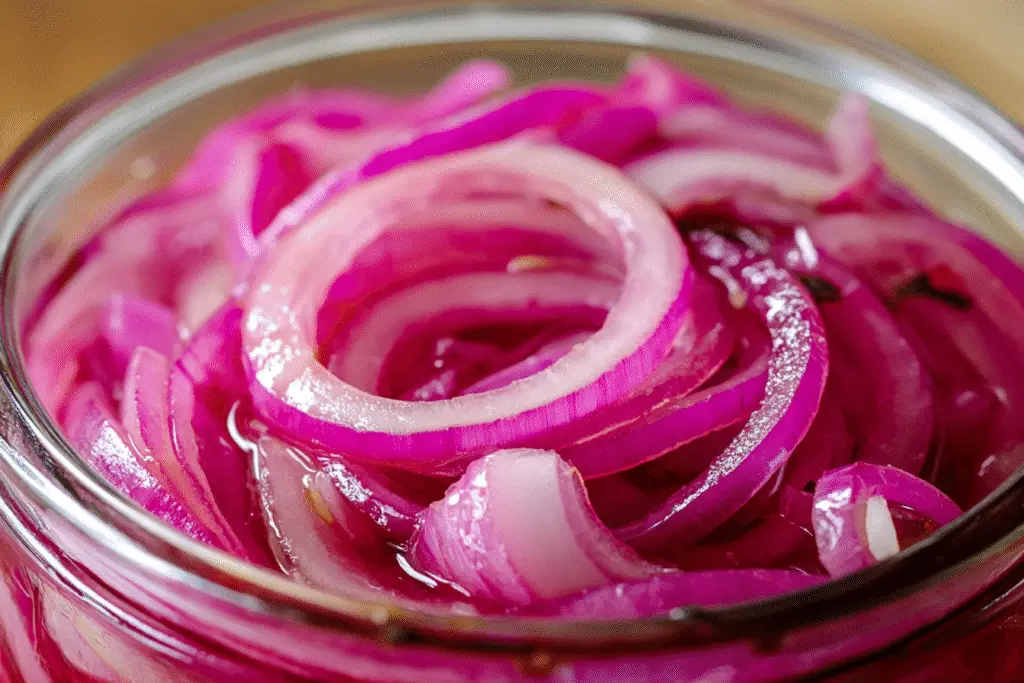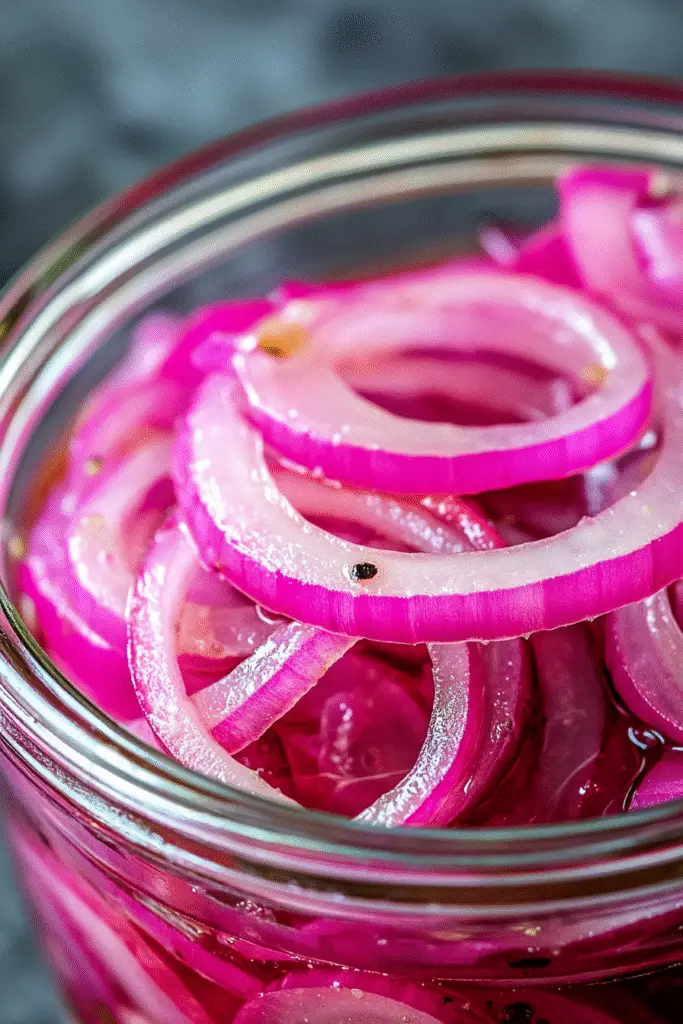Why Marinated Onions Deserve a Spot in Your Fridge
Marinated onions might seem like a simple side, but they’re an incredibly versatile and transformative ingredient that can elevate countless dishes. Whether you’re layering them on tacos, sprinkling them over salads, tucking them into sandwiches, or using them to cut through rich meats, these tangy, sweet, and slightly crunchy onions bring brightness and balance to your meals.
What makes marinated onions truly magical is their ability to quickly soften and mellow through the marination process while maintaining a satisfying crunch. Unlike fully pickled onions that can take days to develop flavor, marinated onions are ready in as little as 30 minutes, though they get better with time.
Their appeal lies in the perfect harmony of acidity, subtle sweetness, and a hint of spice. The process is wonderfully forgiving and customizable—you can adjust the acidity, sugar, and spices to match your meal or your taste preferences. They’re effortless to make, yet they offer maximum flavor payoff, making them a must-have condiment for home cooks.

Selecting the Best Onions for Marination
Choosing the right onion variety is the first step to achieving the ideal marinated texture and flavor.
Best Options:
- Red Onions: The top choice for marinated onions. They soften beautifully, absorb the marinade quickly, and their color intensifies to a vibrant pink.
- Shallots: A milder option with a delicate, sweet flavor that works wonderfully in more refined dishes.
- Sweet Onions (e.g., Vidalia): Perfect if you prefer a less pungent onion with a naturally sweet base.
Onions to Avoid:
- White Onions: Can become overpoweringly sharp, especially if not thinly sliced.
- Yellow Onions: More suited to cooking; they can be a bit too intense when marinated raw.

Recommended Tools for Effortless Prep
Making marinated onions is simple, but a few key pieces of equipment can make the process smoother and more precise:
- Sharp Chef’s Knife or Mandoline: Thin, even slices ensure consistent marination and texture.
- Glass Jar or Non-Reactive Container: Prevents the vinegar from reacting with metal or certain plastics.
- Measuring Cups and Spoons: For precise vinegar-to-sugar ratios.
- Small Saucepan (optional): Useful if you choose to warm the marinade for faster absorption.
Common Mistakes and How to Prevent Them
1. Thick Slices
Thick onion slices don’t absorb the marinade quickly and remain too sharp. Aim for slices about 1–2 mm thick for best results.
2. Overpowering Acidity
Too much vinegar can overwhelm the onions. Balance with a touch of sugar or honey to mellow the tang.
3. Lack of Flavor Penetration
Skipping salt or not letting the onions rest long enough can result in bland onions. Even 30 minutes of resting makes a noticeable difference.
Ingredient Variations and Dietary Flexibility
One of the greatest aspects of marinated onions is their flexibility.
Vinegar Options:
- White Wine Vinegar: Delicate, light tang.
- Apple Cider Vinegar: Slight sweetness with fruity notes.
- Red Wine Vinegar: Deep, robust flavor that complements red onions beautifully.
- Balsamic Vinegar: For a richer, sweeter twist.
Sweeteners:
- Swap white sugar for honey, maple syrup, agave nectar, or brown sugar to complement different cuisines.
Add-Ins:
- Chili Flakes or Fresh Chilies: Add heat.
- Garlic Cloves: Infuse subtle savory depth.
- Herbs: Thyme, oregano, or dill add complexity.
- Whole Spices: Black peppercorns, mustard seeds, or coriander seeds offer nuanced flavor.
Prep-Ahead and Time-Saving Strategies
- Batch Preparation: Make a large batch to keep on hand for the week. Marinated onions last up to 2 weeks in the fridge.
- Quick Marination Tip: Briefly warming the vinegar mixture helps the onions soften faster and absorb flavor more quickly.
- Multi-Use Tip: Save the leftover marinade as a salad dressing base or to drizzle over roasted vegetables.
Flavor Pairing and Serving Suggestions
Marinated onions can enhance a wide variety of dishes by adding a bright, acidic punch:
- Tacos: They’re practically essential for carnitas, fish tacos, and barbacoa.
- Burgers and Sandwiches: Provide a fresh crunch and cut through fatty meats.
- Salads: Brighten grain bowls, green salads, and pasta salads.
- Charcuterie Boards: Add balance to rich cheeses and cured meats.
- Grilled Meats: Especially delicious with lamb, steak, or chicken skewers.
- Breakfast Dishes: Try them on avocado toast, omelets, or breakfast burritos.
Marinated Onions Recipe
Ingredients
Basic Marinated Onions
- 1 large red onion, thinly sliced (about 2 mm thick)
- 1/2 cup (120 ml) apple cider vinegar (or white wine vinegar)
- 1/2 cup (120 ml) water
- 1 tablespoon sugar (or honey/maple syrup)
- 1 teaspoon salt
- Optional: 1/4 teaspoon red pepper flakes or a few peppercorns for mild heat
Instructions
Step 1: Prepare the Onions
- Peel the red onion and slice it as thinly as possible using a sharp knife or mandoline. Aim for consistent 1–2 mm thick slices.
Step 2: Make the Marinade
- In a small bowl or jar, combine the vinegar, water, sugar, and salt. Stir until the sugar and salt dissolve completely.
(Optional: For faster marination, briefly heat the mixture until just warm to the touch.)
Step 3: Marinate the Onions
- Place the sliced onions in a clean glass jar or non-reactive container.
- Pour the marinade over the onions, ensuring they are fully submerged.
- If adding optional spices or chili flakes, stir them into the jar.
Step 4: Rest and Develop Flavor
- Let the onions marinate at room temperature for at least 30 minutes for a quick version, or refrigerate for at least 1 hour for deeper flavor.
Step 5: Serve and Store
- Use immediately or store in the refrigerator for up to 2 weeks. The flavor will continue to develop, and the onions will soften slightly over time.
Storage and Shelf Life
- Refrigerator: Store marinated onions in an airtight jar in the refrigerator for up to 2 weeks.
- Do Not Freeze: Freezing will break down the texture of the onions.
Troubleshooting Tips
- Onions Too Sharp? Let them marinate longer or add a little extra sugar to balance the acidity.
- Onions Too Soft? This can happen if they sit too long or are sliced too thin. For extra crunch, slice slightly thicker or marinate for a shorter time.
- Marinade Cloudy? This is natural if using honey or certain vinegars; it’s still perfectly safe to eat.
Variations: Quick Pickled vs. Marinated Onions
- Quick Pickled Onions: Typically made with a higher vinegar ratio and canning methods, meant for longer storage with a sharper, more pickled flavor.
- Marinated Onions: Softer acidity, often sweetened, and designed for shorter-term use with a fresher, more delicate flavor.
Marinated onions can also be tailored to specific cuisines:
- Mexican Style: Apple cider vinegar with lime juice and chili flakes.
- Mediterranean Style: Red wine vinegar with oregano and black peppercorns.
- Middle Eastern Style: Add sumac and fresh parsley to the marinade.
Serving Suggestions
Marinated onions bring vibrancy to countless dishes:
- Tacos and Fajitas: A non-negotiable topping for carnitas, fish, or chicken tacos.
- Burgers and Hot Sandwiches: Adds bite and crunch.
- Grain Bowls and Salads: Balances hearty grains or creamy dressings.
- Mezze Platters: Serves as a bright counterpoint to hummus, baba ganoush, and falafel.
- Roast Meats: Complements lamb, beef, pork, and even grilled sausages.
The next time you’re looking for a quick, flavor-packed topping to bring a dish to life, marinated onions will be your secret weapon.
